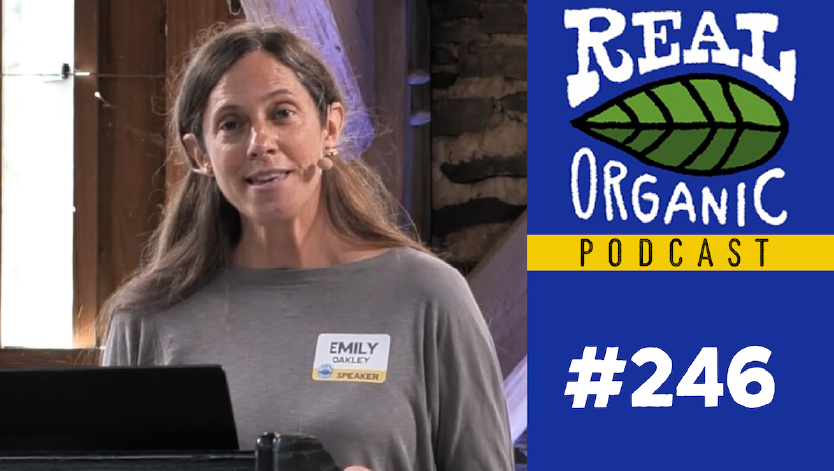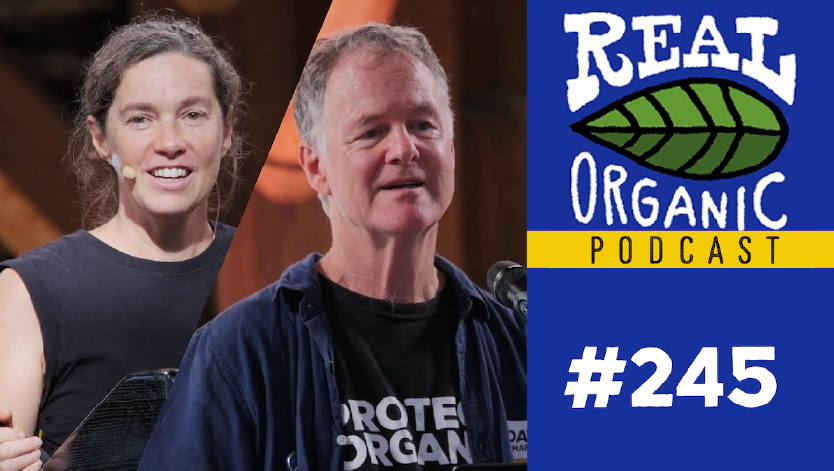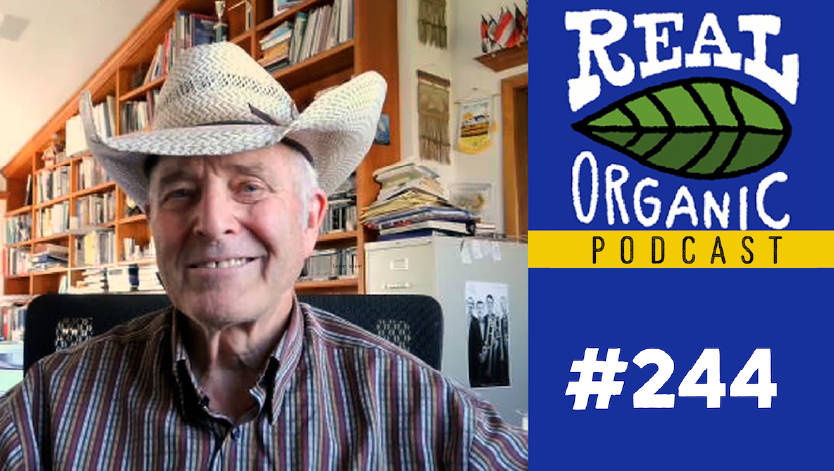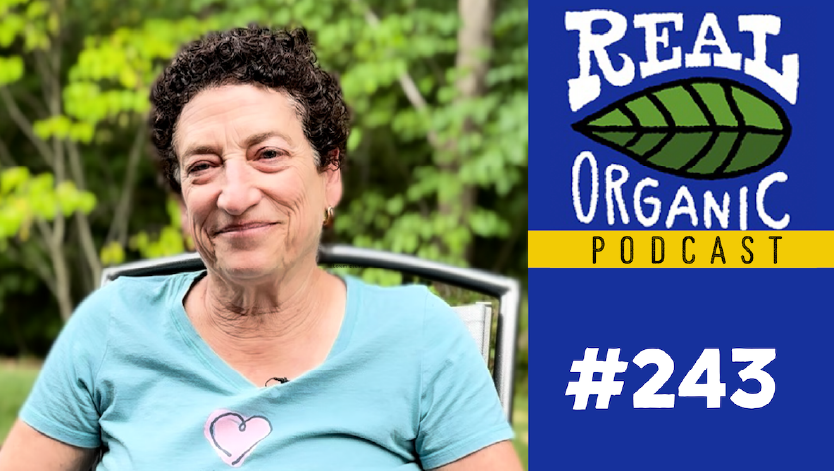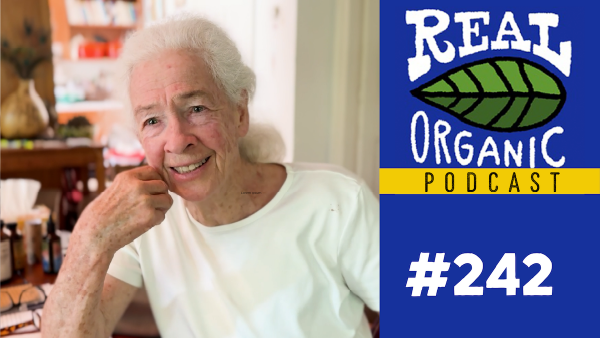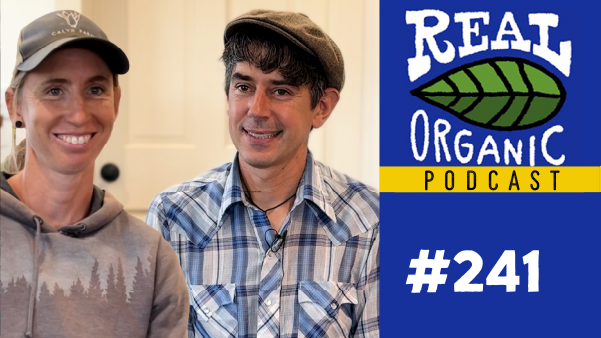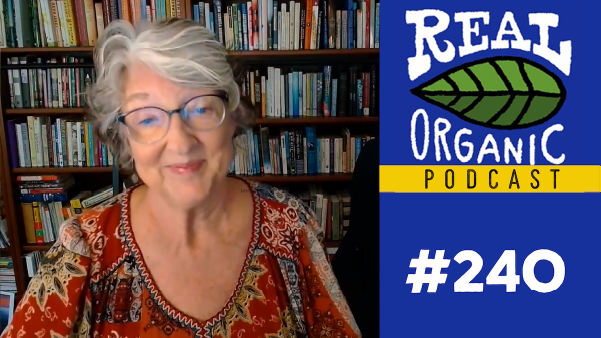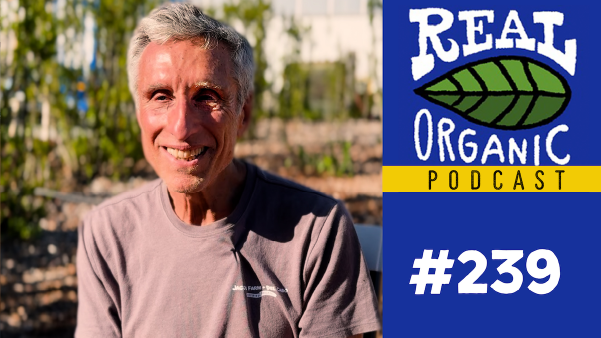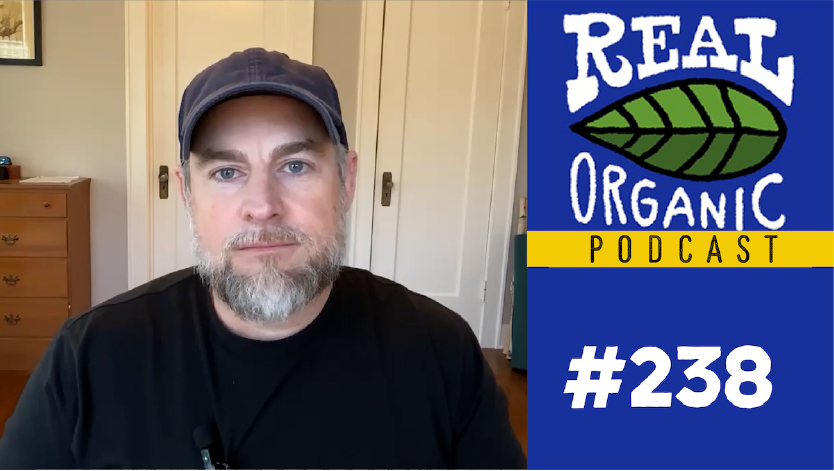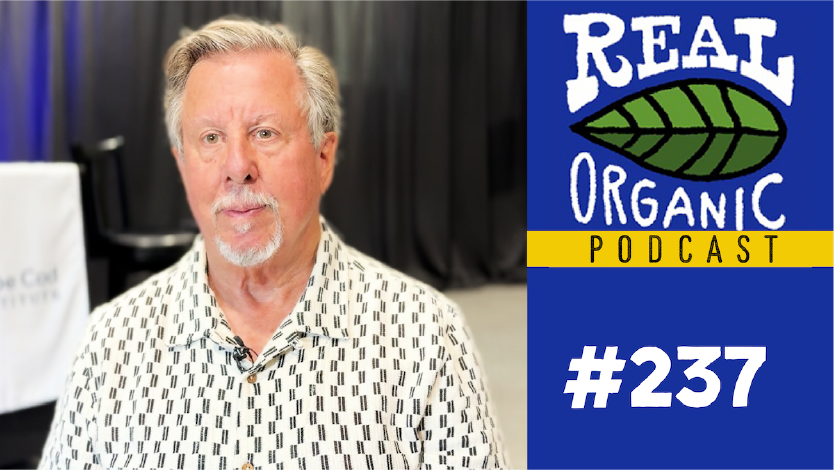Episode #187
Judith Redmond: Becoming An Activist Farmer
Welcome! You can subscribe and download episodes of our show through your favorite podcast app.
You can also subscribe to receive the video version of each episode on our YouTube channel.
Our Judith Redmond interview has been edited and condensed for clarity.
Dave Chapman interviews Judith Redmond at Full Belly Farm, January 2024:
Dave Chapman 0:00
Welcome to The Real Organic Podcast. I’m talking today with Judith Redmond, one of the founders and partners for many years in Full Belly Farm. So, hi, nice to do this. I’ve wanted to do this for quite a while. Can we dive in to how you came to Full Belly Farm?
Judith Redmond 0:26
I was working at the Community Clliance with Family Farmers, which is one of California’s really influential sustainable agriculture organizations, I was the Executive Director. And in that work, I met farmers from all over Yolo County, who inspired me tremendously. And who convinced me that what I really wanted to do was have a life outside working with plants, growing food, and in some ways addressing the policy issues that I was working on at CAFF in a very real grounded down to earth way. In other words, oh, there’s problems with water quality and rivers. Well, let’s not have farmers use chemical pesticides that are getting into the rivers and killing the fish. Oh, there’s people who are eating food that’s really bad for them, well, let’s just try to convince people to eat this food that tastes good and is grown properly. So I met Paul and I met I met drew in some ways through that commitment to the environment and to sustainable agriculture and to changing the way that we farm. And that was really before there was a consciousness about what about what we now call organic agriculture. There was a movement around like pesticide use, and other you know, family farm issues, but there wasn’t anything called organic farming in a in a big way, like there is now.
Dave Chapman 2:14
So can you give me a year approximately when we’re talking?
Judith Redmond 2:20
Well, I came to Full Belly Farm in 1989. Yeah. Dru and Paul had been farming here since 1985. And already there was an organic, an organization that sort of self certified farmers. And they you know, they would certify their friends, each other farmers, which…
Dave Chapman 2:39
Was that the beginning of CCOF?
Judith Redmond 2:40
Exactly. That was the beginning of CCOF that was active here in our county, which is YOLO. County, you only live once. And we so yeah, so they were here at this farm, but didn’t own the land. And then in 1989, I, you know, I really became interested in owning land living on a farm, and perhaps combining that with my nonprofit activism. So that’s sort of how it happened. And I moved here with my partner at that time, role, Adam check, and we started farming as a foursome. Yeah, yeah. 19. In 1989, we’ve created a formal business partnership and worked started working together.
Dave Chapman 3:35
That’s, there’s so much strength in that. But it obviously it’s also challenging. It’s a really common thing in the EU, I know in the greenhouse world, where you’ll have a family greenhouse, and then it goes to the next generation. And there might be three siblings, and they they tend to break down responsibilities. So somebody, you know, does all the the books and the legal structure and tax laws and all that and somebody else is doing the peppers and somebody else does the tomatoes. How did you you all do it? Did you have a breakdown in terms of this is my responsibility? Or were you just saying, I think that tomatoes should be this way? And someone says no, I don’t think so. So how did you work it? Yeah,
Judith Redmond 4:22
you know, I think why our partnership. We were so lucky. We came together, as I think a for really idealistic, passionate individuals who wanted to farm and I think we were so lucky because we, we didn’t really have a, you know, a plan and an outline that said, this is where we’re going. We also knew that we weren’t in the whole thing because we wanted to make money that wasn’t motivating us. It was really just the farming that motivated us. And I certainly at first, we there’s just so much work that you all just pitch in. You’re, you’re you’re all doing the picking, you’re all doing the packing. Everyone has a farmers market that they go to everyone drives trucks and forklifts, and does it all everyone’s just in there deep. But of course, over time, our roles did separate and, or, or become more distinct. And people had projects that were their projects and skills that were more their skills, I would say yes, that that happened. But in some ways, what made our partnership work was that we all really wanted it to work. From the very beginning, we believed that this farm and this place, and those relationships that held it together really, really mattered. In some ways more than many other things, you know, that most people think matter like money or you know, you know, what people now call life work balance, you know, all of those things. They weren’t things that we were really worried about, and certainly planning for the future in a way that you think about that. Now, we were very much in the moment. And we all just did what had to happen, what had to get done. And I think we that is continued at the farm, if you watch the way everyone works, they’re all in people that are farming here are all in on keeping this farm as perfect as possible.
Dave Chapman 6:36
Okay, so where does that come from that all in, you know, the the, the normal model in our society is somebody starts a farm or any business. And they usually pick something that they love to do, but their definite goal is to make a living and preferably a good living. And I’m not saying that, that you didn’t want it to work financially, but but this is the second time I’ve interviewed someone this week, who says it really wasn’t about the money i i talked to Arnie and Ron cos who started Earth’s Best baby food. And they said our goal wasn’t to make a successful business, our goal was to save the world. Well,
Judith Redmond 7:18
thinking, from my point of view, to in some ways, the return that you get from this farm is so incredible, that talking about it in in sort of those terms that are somewhat material may not, it may be we need to express to the world how lucky we are in some ways to be farmers, and what an amazing thing it is to have that life. Because it starts with the access to being outside which for people’s mental health is underestimated, it’s very, very important to be have access to a natural place. And we have that, and many, many people don’t. And so that’s number one. Number two, is we because we’re such a diverse farm I we have access to so much amazing food, and we get to have it fresh, and we get to learn about it and changes all the time and eat you know these figs from this fig tree that’s hanging all over us, you know, when they’re really first ripe. And when they get really fermented on the tree and all the different, you know, we get to experience those flavors, just firsthand, we have space. We have this sense of security people in the city who’ve known full belly farm for 35 years, say you know, when everything falls apart, and things are a catastrophe, and in the Bay Area, we’re going to come to full belly farm and we’ll be there with you. You know, because it’s a safe place and you have food and people it’s there’s a sense of the future here. And so so there is no way that my life has been minimized as a farmer. And so more more, I’m working now, as I’m working less at the farm not working full time at the farm anymore. I’m working more with new farmers and people who are going to go through that struggle of maybe having an identity as a farmer in this world and need you know, business skills or other kinds of skills so and support really, they need support, because it’s hard to start as a farmer now. So I want them to be inspired to experience the same way that the Earth gives. gave to us here at this farm as I was, you know, a youngster and then growing old here. That’s the lucky I hope that for other farmers. Is that answer? Yeah.
Dave Chapman 9:58
Oh, so so much there to the thought, you know, we’re gonna tease this apart, it’s great swelling all over the place. This is, this is a good image of full belly farm and the food is literally dropping at your feet. I have come here for some years now and I always am fed. So well, it’s it really it’s it’s exceptional. So you said it was easier than I think, to start a farm than now for a young farmer? Is that did I get that right? Is that what you think?
Judith Redmond 10:31
I’m I, I do know that farmers need support when they’re starting
Dave Chapman 10:38
to have that support.
Judith Redmond 10:42
We were pretty independently, none of us had family money, none of us. I, you know, really believed in the industrial paradigm. We felt like Co Op extension wasn’t supportive. I don’t know what kind of weather I would say yes to that. But I am more aware of the way that land access water access, food safety rules, regulatory pressures. I am aware of the risks that farmers face in a way that I wasn’t then and I feel like perhaps in 1989, we were we were more able to skate a little bit under the radar, then you are able to now the regulatory radar. Yeah, yes. Yeah, it’s not that we were doing anything we shouldn’t have no, just but just that there was not people knocking on your door to inspect and check on you and rules that you had to follow when the irrigated, you know, lands program and this and that there’s many different in California, especially, there’s just so much that farmers have to deal with that. I think it can feel like they don’t get to farm too much sometimes.
Dave Chapman 12:02
Right? There’s a lot of a lot of regulation to deal with. It’s interesting, you know, David Weinstein. Yeah, so he said to me, when we were talking that back then we didn’t have capital. And instead, we substituted basically, our blood, sweat and tears, people work for very little money. And they work very hard and very long. And, and they got other rewards. And, you know, eventually some of them did, the businesses did make it but now it’s more likely that a business right from the start is going to substitute capital for some of that. So there’s, that’s certainly
Judith Redmond 12:48
the model isn’t it? I was I, we have some friends, some African American farmers who are trying to get land and they I was talking to them the other day, and they were describing that and how expensive it is to try to buy land. And to figure out the structure, the business structure, because they want to work with lots of different people. And we talked about this question that that you raised of whether it makes sense to just capitalize so that you can sort of have your buildings and have your structures that work and have a irrigation program, you know, it’s all the things you need to make a farm work a few tractors, isn’t it? And I really encourage them to evolve over time, because I don’t think you really know what your priorities and your needs are going to be at first, you’re still learning. And I think it’s okay not to start off with a lot of capital and big, big, big plans.
Dave Chapman 13:49
Yeah. Yeah. I, you know, as I see farmers a aged out and look for people to take their farms, one of the things I see is that these farms evolved and become so sophisticated over a lifetime, so complex, and for a young person coming in, it’s just overwhelming, they haven’t made those 1000 errors, those 1000s of mistakes, that you bear the scar tissue but you also become better you learn over and over and over to suddenly step into at scale that you didn’t you didn’t go through that learning
Judith Redmond 14:26
processes might be more costly at that Yeah,
Dave Chapman 14:28
that’s right. It could be disastrous without without that intuition that isn’t just come out of thin air. It’s come comes out of
Judith Redmond 14:37
stir. Yeah, yeah, and you know, farming is is probably every farm is different. So I’m only speaking from my experience, but it feels to me like farming, has, is complex and has met has an opportunity at every corner. You know, like at every turn. You could try something a little different and learn something new So, I feel like this farm there’s always experiments. Yeah. in people’s heads and in, in the actuality of what people are doing. So, yeah, it’s not a formula. It is a formula on some farms. Yeah, there’s a formula. And that makes it easy for people, they just have a formula. But on this farm, it is not a formula.
Dave Chapman 15:20
I think full belly is the most complex farm I’ve actually ever seen. So can you just briefly describe for people, you have so many crops, and a lot of a board? Many.
Judith Redmond 15:36
But yes, we have many, many crops. And we also have many enterprises like, so we have many. You know, we sell our crops through farmers markets through a community supported agriculture program, to restaurants, to stores and to wholesalers. So we have lots of a diversity of marketing avenues. But we also have value added, which I think has been a great addition. So we have jam and pizza dough, and, you know, tomato sauce and value added products that come out of a certified kitchen that’s on the property, and that two of the second generation farmers manage. And we, we also do these events and outreach and sort of kind of community building projects and so forth. So yeah, there’s a lot going on. There’s perennials, there’s annuals, there’s flowers, as as well as crops that you eat, you know, there’s just there’s nuts like fruit, there’s sheep, there’s chickens, there’s pigs. Yeah. There’s a lot going on at the end of each, you know, many of those things were brought in and onto the farm because of the interests a that drew rivers who’s one of the owners had in sheep and livestock, you know, and cows and bringing livestock to the farm. So yeah, I get I get to have a pretty 360 diet here. I have milk from our cow meat from the sheep, you know, vegetables, fruit nuts.
Dave Chapman 17:13
How many people work on full belly.
Judith Redmond 17:15
There’s a crew that’s a year round of around 60 people. And then when ours are really heavy harvest season starts, which is really about six months out of the year, it’s a pretty long harvest season here in California. We amp it up to at least another 40. So there’s at least 100 sometimes more than that, on the farm working so every day. There’s a choreography of the irrigation crew and the harvest crews and the packing shed crew and the field work crew all doing what they need to do and the kitchen crew and the livestock crew.
Dave Chapman 17:54
Yeah, no, it’s remarkable. And I I so admire that you actually full belly existed pulls it off that the whole team that it works, and and it doesn’t just work a little bit, you have great food. So one of the things I’ve noticed about full belly, and just just a nod to this is pretty much everybody I talked to, in the Greater Bay Area, knows full belly, and reveres full belly, and just has this this warmth. There’s somebody I’ve invited to come up for an interview on Sunday before our event. And he said, Oh, yes, I’ve been to the hose down. I know it, I love it. So you’ve done so much to connect the community to your farm, as well as to feed the community. But people feel that connection, you’re not just a label on a wholesale, you know, shelf that that which is wonderful, you know, and people brand their stuff and and eaters get to know it, but people feel a genuine connection to your farm, as you say they they see this as the safe place. Well,
Judith Redmond 19:08
you know, I mentioned that there’s a sort of a kind of farming that I believe is a little bit easier, because it’s a formula. Yeah, there’s more of a formula that the farmer can use to grow the crop. And and I think, a farm like this, and that does that kind of outreach. The reason I think we’re motivated to do that here is that there is a tenuousness about farming in California. There’s water policy, for example, that is trying to preserve the groundwater Well, meaning, you know, to keep the groundwater aquifer sustainable, but it’s unclear if in doing that, it’s not going to all end up in the hands of a sort of more industrialized type agriculture. It’s also unclear Where if there isn’t enough water in California to farm over the long term with climate change? It’s very expensive here, it’s really more expensive to farm here than in many other places. Minimum wage is going up again next year to $16 an hour, it’s you know, more than in most parts of the country, certainly more than the federal minimum minimum wage. There, I mentioned the irrigated lands program, the food safety, pressure, and inspection pressure here is very, very strong, very high regulatory pressure. So I think we feel that tenuousness as a well established farm. But I think other farmers say in the San Joaquin Valley, which is sort of the home of large scale farming, see it all the time, and it’s way cheaper to grow food in Mexico way or in other parts of the planet and ship it here than it is to grow food here. And so why? Well, labor is very, very inexpensive. In other parts, compared to here, labor is very cheap. And labor is 60% of our cost, which is high, right? I mean, if you look at your labor as a percent of expenses, some people look at it as a percent of income. I’ll talk about it as a percent of expenses. My fully loaded labor with health insurance workers compensation, plus course salaries and wages. It’s very it’s six 60%. And that’s much higher than it would be if we were not paying people a lot of money to work, or if we weren’t giving them some health insurance benefits. And if we weren’t trying to take care of them. So
Dave Chapman 21:38
my understanding is that you actually start people at higher than minimum, right?
Judith Redmond 21:43
We do try. I would say that that as the state’s minimum, we’ve always said that, but as the state’s minimum wage has gone up, I think if you examine the books, you might find that it’s not 100%. But we have had that. That is that has been our goal. And the majority of our employees who are year round are well above minimum wage. Oh, yeah. It’s but when people start sometimes they have to prove themselves a little bit before but at any rate, yeah. Absolutely.
Dave Chapman 22:10
is pretty impressive for a farm. I know. I know, some farms out here who do it but not very many farms in the country can do it. Yes. In fact, many of the owners don’t even have exact That’s right. And the owners can’t afford healthcare. Yeah.
Judith Redmond 22:25
And so I think I just, I kind of just wanted to point out that tenuousness as a way of saying that the community, these farms can be independent, and imagine themselves as entities that exist in this cloud of dust and bubble and hard work. But actually, we need to be connected to the communities out there so that we have support not just for this farm, but really for the concept that farming is an important part of a society, right? Farming is an important part of the rural landscape, working lands matter to the water to the air, you know, we all are in this on this planet together. And we have to figure out together how to take care of it. And if there’s, if, if the farmers can’t manage to survive, I think it’s just a, you know, a bad sign we all need. We’re all in this catastrophe of climate change and environmental disaster. We’re all part of that. And we all have to solve that problem together. And so we need farmers. So that’s part of I want it to sort of go off on that tangent when you sort of it’s true that there’s a lot of support that we’ve built, I think and the and I want it to sort of think through parse through a why why is that important? Yes.
Dave Chapman 23:55
Well, yeah, it’s important for so many reasons. But but one of the amazing things about it, is that you’re able to pay it back or pay it forward, you’re able to have people making a living wage, you’re able to have people have health care, you’re able to have health care, these are things that we want for all of our citizens. But but in the case of farms, sometimes it’s about the personal support your farm gets from their customers. And sometimes it’s about the regulatory world in which we live and the food system and how do you get paid and how are people supported and his price what really matters?
Judith Redmond 24:33
You’re absolutely right. It’s it’s there’s there’s there’s a lot that the farmer, him or herself can impact on their farm so much to make it a respectful, good workplace, to take care of the earth and soil. There’s so much that we can do ourselves, but not there’s so much that stacked up, right? I mean, it turns out that I think immigrant immigrants are something like 17 percent of the US population, and they’re like 83% of the agricultural workforce. And those immigrants, they’re here without their families. They’re here 50% of them in California are here without correct papers and documents. They’re, they’re feeling isolated, you know. So that’s an example. That’s a structural problem that we have in this country, we have not addressed the problem of agricultural labor and immigration. And it’s not just agriculture, right? You know, that. It’s like, people that work, cleaning hospitals, people that work for fast food there, many of them are immigrants, also slaughterhouses.
Dave Chapman 25:37
Construction says, Yeah, cuz, you know, I mean, I mean, you know, some of the jobs are terrible, some of the jobs are not, but but they are woven into the fabric of America, part
Judith Redmond 25:47
of us. And yet, there’s a structural problem, that it’s not even though farmers are, you know, very much woven into it, too. It’s not their fault, that there’s a labor shortage, and that, that the labor is sort of hidden somehow in the darkness of our society. Right. And thus, you know, so I feel like what you said is so true, it’s, there’s structural issues that farmers face, as well as just the complexity of building the soil and keeping your animals healthy. Yeah, something
Dave Chapman 26:24
that I didn’t know, that I’ve learned recently is that most of the agricultural labor in the high labor things like vegetables and fruits, in other countries is also immigrant labor. So in Mexico, it’s not the local people around that farm, who are mostly picking those berries. It’s people from other areas who have no work sometimes from Central America, sometimes indigenous peoples, but it’s, it’s not their first choice, either. It’s just the only work they could get. And as a result, they get paid very badly. And barely barely get by. Yeah. Right. And that’s why we look at the cheap food. And we go bullets, not right. No, it’s not cheap. It’s just that somebody paid for it. Yeah, yeah. Yeah. Okay. I just want to say one thing. I have a question. But something interesting about water policy in California. The guy I’m gonna interview on Sunday is Daniel O’Connell. I don’t know if you know, do you know him? Yeah. So he’s written a lot about the evolution of the water policy in California. And that when they did all the waterworks in the Central Valley, I think back in the 30s, and they created this water system so that farm farms had all this possibility of irrigating the law was that only farms that were 160 acres or less, and that the farm owners lived on the farm, they were
Judith Redmond 27:56
the only ones that would get the subsidized water. And then that was increased to 960 acres. And the way that the farm operators got around it is that they created what used to be called Christmas tree farms, basically farms that were operated large, large 1000s of acres, like four or 5000 Acre Farms that were operated as one farm, but they created these little fake trusts. And so when I graduated from the University, and got went to work for the California Institute for rural studies, where Don VRA, who was the director, I did a three year Ford Foundation funded research project, that we work with an RDC and Natural Resources Defense Council and we I went to all of this, I won’t it’s too much of a tangent. I have some fabulous stories, where I went to these counties and I went to the public, I did public research into public documents to prove the way that these Christmas tree farms were structured and found, like trusts that had people’s dogs listed as trustees, you know, literally like they would they were completely transparent about it because the Westlands Water District, the largest water district in the country sort of told them this is how you do it. This is how you get the subsidies. Even though you’re a 5000 acre farm, you just pretend that you’re not by creating these paper farms, and it ended up in a lawsuit. I won’t tell you all the fun stories, but it was a lawsuit against the Bureau of Reclamation. And they we ended up settling out of court around it so it never really we didn’t really ever won but calf community lies with family farmers actually brought a lawsuit with some Indian tribes and the NRDC on that very issue that you just mentioned. Yeah, and I was I got those first my trip to fruit went to Washington. I got my phone suit, clothes and everything went to Washington was sitting in the room where this, you know, I said that we negotiated in court out of court, it didn’t actually go to trial. And I was very young and naive, I guess, and I, or whatever whoever I went to, I went to the room where they were having this negotiation. And the people from NRDC were the lawyers, as well as Abascal, who was the California Rural Legal Assistance lawyer. And I walked into the room and you know, who, and there was the Westlands, water district lawyers, and all of a sudden, the lawyers for JG Boswell had turned up. And JT possible was one of the largest farms in the western border district. And they were there to even though they were they were farmers, like they were representing this enormous farm that was one of the worst offenders of some of these rules. And they ended up in the room there, with the, you know, out of court negotiations on this question that you just raised a lot of stories behind that subject. That’s
Dave Chapman 30:58
great. I didn’t know you had that history. So you know, this is not really a tangent. This is actually central to what our symposium is about this winter. It’s called break them up. And it’s about the consolidation of power and money, in agriculture in the food system, not just in agriculture, but in distribution and retail. And we’re one of the people who will I will interview with Zephyr Teachout who wrote the book, break them up. And she talks a lot about Big Ag in it. I’m curious, from your experience, do you think that would be a good thing? And even if it would be a good thing to break up these large farms the way they broke up Standard Oil? Or do you think that it wouldn’t be good? Or even if it would be good? Do you go? Yeah, but that will never happen. You
Judith Redmond 31:55
know, I don’t have a I don’t know that. I want to give an opinion on that. I think that you can be a large farm and be a good steward. Right. And that’s what that’s that’s got to be the goal that we have right now. I feel like that goal may be more central have a question, I because I’ve had this conversation with people who say there’s no way that you can take care of 1000 acres properly. But when I see this farm were 500 acres and the way that we have six owners and boots on the ground everywhere, every corner all the time, six days a week, I feel like well, it is perhaps more difficult to take be good steward if you have a larger farm. But that’s the goal. And that’s what we want to make possible. And so I think that’s the central question is how to be a good steward. And whether you can do that on a really large farm. So I’ll just I’ll just leave it at that I do you think it’s true that really large farms, because they have more concentrated wealth can also do more damage? And right, and so I do see that side of things. But I, I think I’m the way I see real organic project in some ways is that it’s sort of the well, let me start, I see that we need to have a pretty big umbrella. I think that we need to have an umbrella that includes farmers in the Central Valley in the San Joaquin Valley, who are using chemicals are who are, are not farming necessarily organically, they have been there with their families, they have inherited the land from their families and been there for generations. And I feel like I want them in my umbrella, Under my umbrella. And I feel like what real organic program project has done is they’ve said, here’s the umbrella, we’re going to move it in this direction, you know, in terms of what organic means, and how how good you can be and how, how, what the goal is out there. But for me, I also I love that and see that but I just feel like we should never close our doors to those multi generation farms in California, that that have someone who’s who’s there with a family possibly and who’s genuinely trying to do their best to hold on to that land. And that doesn’t characterize a lot of farms that are out there. You know, I can I can see Daniel or Canary Connor thinking about hearing this and he’ll say, Well wait, you know, like, there’s a lot of farms out there. The owner has a helicopter and lives in Chicago, you know, so it’s a spectrum. What we see out there, there’s in the San Joaquin Valley is that there’s a lot of really industrialized formulaic approaches to agriculture. But there’s also an openness to change that we’re never going to change agriculture. If we don’t keep our door open to those farmers who aren’t doing it the way we are, and, and we can’t close the door to them so well, I, I
Dave Chapman 35:19
would never want to close the door to anybody. The challenge is when Godzilla walks through the door, he tends to take out the whole door jamb. And then he sits at the table and says, what’s for dinner? And you’re gonna serve Godzilla with Godzilla once I or else Godzilla, will you? So I think that, that being open, and and having conversation and working together and recognizing the common humanity is one thing I actually believe I do. I am a little bit of a free market capitalist in that I just don’t think we have a free market. I think that that if, if we could have organic stand for actual organic, then what would happen is people would see that there was a market that they could get paid more for doing it. Right. And they would do it. Yeah. And so these programs, these USDA programs for how do we encourage people to go into organic seems insane to me, it’s simple, just enforce the law. And, and organic will grow, and it will naturally draw people in. And that’s, that’s my belief, you know, Bob Quinn tells a wonderful story of converting to organic from being completely believer in a conventional system. And he just did it for economics. And then he got it. Yeah,
Judith Redmond 36:43
yeah, I mean, I, I, we I work a lot with CDFA, California Department, food and agriculture, on their programs that provide incentives for farmers who want to use compost on their land, or put a hedgerow in or grow a cover crop. And I don’t know how, one, we haven’t done enough analysis of that program, which has been going on for a number of years and given out a lot of grants, multi million dollars worth of grants to farms, whether or not those farmers are actually making significant continuing to make significant changes in in their way of farming. But I do think that those programs that provide incentive money to those farmers to take on those practices, I think, are beneficial overall. Because they you know, they get them to have a taste of it and see if it works. And it does.
Dave Chapman 37:49
Well, we just gave away almost $3 billion for that. Yes. With a climate smart grants. And, and we gave it to the very ringleaders of the problem. Yes, most of it. Yeah.
Judith Redmond 38:01
Well, that was a really top down. Kind of Quick Fix kind of approach. Yeah, that wasn’t what these grants here in California, are they have? A much better, more ground. Ground grounded approach to it. Yeah. It’s not a quick thing. Yeah, it’s been going on for a while. Yeah,
Dave Chapman 38:26
I mean, we can only hope that the 3 billion isn’t, isn’t a waste. You know, it’s hard for me to imagine that. You know, the Iowa pork Growers Association, or or bear is going to do anything that threatens their basic model. I just, it’s too great a leap for me. But yeah, you know, maybe some good will come of it. So let me ask you a question. This is something that I had back when we were still keep the soil and organic before the real organic projects formed. And and actually, Paul connected me to a younger farmer who second generation organic farm, quite successful, and suggested that we have a conversation about hydroponic inorganic. And he he was confused about even why that wouldn’t couldn’t be organic. And we had an hour long conversation about it. And very friendly. And at the end, he said, Well, I’m almost envious. I’m really impressed. Because I think that in the northeast, organic still has idealism. And in California, it’s pretty much become a business. And I thought, I don’t think that’s true. I know very idealistic, organic farmers in California as well as everywhere else in the country. But that was his experience. And, and clearly there was a some truth to what he was there was a truth to what he was saying, which is that it’s so developed in in California as a business. And it’s easy for that idealism to be lost in the shuffle. Yeah, yeah. So yeah, what do you think about that? Yeah.
Judith Redmond 40:25
I just know, a lot of really idealistic young people. Yeah, that’s the thing. Who are you know, and I, it’s not only that they’re idealistic, it’s that they really don’t want to be a cog in the wheel of our sort of current catastrophes, they want out of that. That kind of equation. And I want to I saw, I want to encourage that. And I think that sort of, I think it’s really easy to be a sort of us. Just a skeptic, you know, about organic it, it is a that’s a very easy in our society, you know, it’s just like, every black and white everything’s like, you know, yes or no, it’s not nuanced. And I just, I think you just have to look a little deeper. And you’ll find that we just, it’s all up to us, you know, if he, if this if this, if there’s a person who looks at the organic industry in California, and feels that it’s not idealistic anymore, just do something that’s idealistic and be passionate about what you love. Right? I? I don’t I don’t know, I think it’s too easy to be a skeptic. Like that, you know? Yeah, one
Dave Chapman 41:50
of the things that I’ve seen that has always impressed me about full belly, is that you take it, I would say, as an outsider, that the partners see it as part of your responsibility, as farmers as organic farmers, to also find other ways to give back to the community, like your work with calf, like Paul’s work with real organic. Right. And I think that work with farmers markets work with, you know, this, and that, that there’s a lot of work being done. Yeah, that is voluntary. You know,
Judith Redmond 42:29
a lot of volunteers have a lot of volunteerism around here. And I think it’s a great platform for that, we’ve proven that it’s a really great platform, because we have credibility, I think, as people who have worked very deeply in this one place, for so many years, it’s given us an understanding of say, how policy impacts a farm like this, or how we can impact the environment in the soil, and how we can change things over time, and how, you know, education of little kids, you know, little kids can be, you know, photographs of little kids at the Berkeley farmers market, picking up their CSA box with their parent and opening the box. And parents like trying to put the stuff in a basket. And Luke is grabbing a carrot and grabbing the strawberries and throwing them in their mouths and eating them and you go, when you’re then you’re we’re somewhere else. And well, my kids don’t really like vegetables, and you’re like, Well wait a minute, you can have some good vegetables, and they’ll be stealing them out of your refrigerator. And, and that little kid, you know, maybe they get to be part of a school group on a farm like full belly maybe. And they have to go pick their carrot, and then they have to go chop it up and put it in a salad and they get a sense of where their food comes from. And then pretty soon, they might get to go to kids camp in the summer, you know, somewhere on a farm and see what you know, happens at the kids camp. And then pretty soon they’re volunteering at the hose down. So there’s this, there’s this whole there’s this whole opportunity for families to be involved at many different levels. And I think, yeah, I think it’s helped. I think it’s helped make it make an impact on kids seeing that they can, you know, we had some friends over and one of the Jill was saying to Joe Mathias and was saying, you know, my kids came to Camp at full belly. And then when they went to school, they found that the student farm was sort of not flourishing, so at least went immediately both of them started trying to fix up the student farm and then they started a program that brought kids to the farm and then you know, so in other words, there’s just, it multiplies and it grows and it’s, it’s people really need to understand where their food comes from and what farming is about and giving them that opportunity is is huge. just sort of see how it’s, they’re not skeptics anymore those kids, right? You know, they know what a good carrot tastes like. Yes.
Dave Chapman 45:07
So one of the things that somebody once asked me, I was speaking at a rally, and they called out, what can we do? And everybody gets asked this question, right? Who gets up and speaks about these problems that we all face? What can we do? And you have answered that question with your life you have answered it with this is what you can do. Okay, you and I would say that you both work on building a positive solution, a model, look at this, I did it, you can do it. And you’ve also worked on regulatory reform through calf, you, I didn’t even know that you were in a lawsuit about water rights for smaller farms, which was what that was about. And access, right. And, and we know that those regulations literally change, who stays in business. And who doesn’t, when they when the when the Central Valley Water Authority created that system, a whole lot of land, large land holdings suddenly became much more valuable, because they suddenly had access to irrigation water paid for, by you and me, paid for by the taxpayers. So we gave a grant to these large landowners. It wasn’t intended the law was that this would go to small, diversified farms. So I’m curious, at this point in your life, when you look at all this, and somebody says, What can we do? How would you? Yeah,
Judith Redmond 46:46
so I think it’s a question that I often ask people or and think about myself, because there’s many things that you can do on a personal level, where, okay, it’s just, for example, you know, things like, you know, recycling and reusing, using less not being a consumer, trying to use less water, and all of those things that the policy wonks will tell you, that’s not what it’s about. It’s about changing policy. It’s not don’t feel guilty as an individual and force yourself to use less water or, but but I have to say that I believe that that muscle memory, of thinking about the preciousness of water, and the value of soil and the importance of not wasting our precious resources, and having that become part of you as an individual in the way that you live. I kind of think it is important. And I I’m open to criticism, and I would have a conversation with the policy people, I don’t think you have to feel guilty if you don’t do it all the time. And you don’t have to make your life a misery in any way. But just recognizing how privileged we are here in this country, and how many resources we’re using compared to anyone else in the planet on the planet, really, even in Europe, even in other development, we use so many of the world’s resources, that we could tone it down a little bit. So I do believe that we have a personal responsibility to respect the preciousness of the resources that we have access to. And as an individual, that’s something that we can all do, we can change our own individual lives. And so there’s that. But then there’s organizations everywhere, in most every state, there’s organizations of farmers, and restaurant tours and policymakers that are working on these issues. And if you are a hard working person, and you have kids, and you’re busy, and you can’t really volunteer for them, even if there aren’t our volunteer opportunities, you can always give them a few dollars. And I think that we we buy copies and this and that all the time. And we need to support organizations because we are facing some crises, right. I mean, we are facing really climate change problems. And I mean, I won’t go into it. We all know it’s not doom and gloom, but we know there’s some hard problems that we’re facing. And we need organizations that know how to build teams, and to work together and to collaborate to solve those problems who are thinking about solving those problems. So we need to support those organizations. And if we don’t have energy to do it as volunteers, a few dollars instead of a chai latte or whatever. That’s that’s what you can do. So and then you can volunteer. There’s many opportunities to volunteer. So I don’t think everyone needs to start a new organization, I think that there’s so many opportunities to, you know, to be part of the real organic project or to be part of the Organic Farmers Association or to be part of community alliance with family farmers. And so there’s many things that that you can do that I do think it starts as in your head and in your heart as you look around and recognize that we live in an amazing place and as a species, we’re not being responsible stewards.
Dave Chapman 50:38
Well said Judith. Really? Yeah, that that might be good. But, but I always like to say, is there anything else that you would like to say we’ve talked for? No, I’m good. You’re good. Yeah. Thank you. So Judith Redmond, thank you so much. Yeah. I’m really glad we did this. Good.


